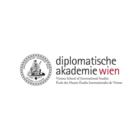Nick Cullather is professor of history and international studies in the Department of History at Indiana University's Hamilton Lugar School of Global Studies. Nick, who is the 2021–22 Fulbright-Diplomatic Academy Visiting Professor of International Studies, virtually sat down with us to answer a few questions.
Interview with Nick Cullather
7 April 2021Read our brief interview with 2020–21 US Fulbright scholar Nick Cullather.
Fulbright Austria: How does your teaching experience in Austria compare with your teaching experience in the US?
Nick: The Diplomatic Academy (DA) is the oldest school of foreign service in the world; the school I teach in at home, the Hamilton Lugar School of Global Studies (HLS) at Indiana University, is one of the newest. The students at the Diplomatic Academy are a small, select group drawn from all over the world who live, work, and study together in a building on Favoriten Straße, so they have a special bond. Many of them will go on to work at the IAEA or other United Nations/multilateral organizations here in Vienna or elsewhere. Others will go into diplomatic positions or international business. They are further along in their careers than the students I teach at home, and in many ways they are living the life many of my students in Indiana aspire to have one day. But as a teacher, I try to give them the same training in how to investigate foreign relations for themselves, how to evaluate evidence, how to think about motives and interests, and how to prepare clear, convincing reports.
Fulbright Austria: You were recently featured in The Atlantic, where you talk about the relationship between architecture and human interaction in the US Capitol. Do you draw any connections with infrastructure in Austria?
Nick: I see that the Parlamentsgebäude is currently undergoing a thorough renovation at the same time architects are reworking the grounds of the US Capitol to ensure security. In addition to considerations of heritage and sustainability, architects have a particular responsibility to ensure that public buildings remain public. Increasingly our elected officials are people we only see on screens, a trend intensified by the pandemic but not caused by it. A lot of the disaffection voters feel about their officials today comes from the sense that office-holders are not people like them. Unless voters and their representatives can meet and work out their differences face to face, they will shout at each other through social media. Good public architecture is essential for making democracy work.
Fulbright Austria: How does virtual infrastructure inform your interactions with students and faculty at the DA? (What is gained? What is lost?)
Nick: Unfortunately, in the last term all classes had to be online. The small size of the DA and the fact that it is a residential school have made some one-on-one interactions possible, and it still is possible to pass paper copies—assigned papers, for example—to each other so that we aren’t merely interacting through pixels. Our fingers are crossed for the coming weeks, in hopes that next term will be more open.
Fulbright Austria: In developing new international studies curricula at Indiana University, you drew on a wide variety of disciplines. What were the key components? Could you share some of the primary ingredients with us?
Nick: At HLS we tried to restore a vision of global studies first introduced in the early twentieth century. It combines two parts: an intensive study of the language, culture, and history of a particular world region—a set of disciplines called “area studies”—with a social scientific approach to the economic, historical, political, and technological issues that all nations have in common. This latter discipline we call international studies. It is based on a premise that students trained in more than one discipline will approach problems in more innovative ways; a student of cybersecurity with a background in both information architecture and Russian, for instance, may be just the person to address certain kinds of threats. No two of our students come out with the same combination of experiences and skills, but we feel this gives them the versatility a changing world requires.
